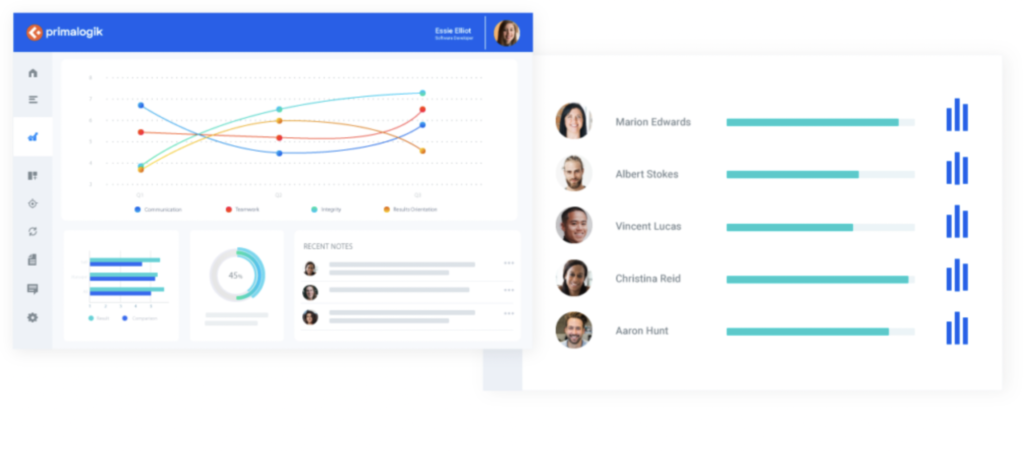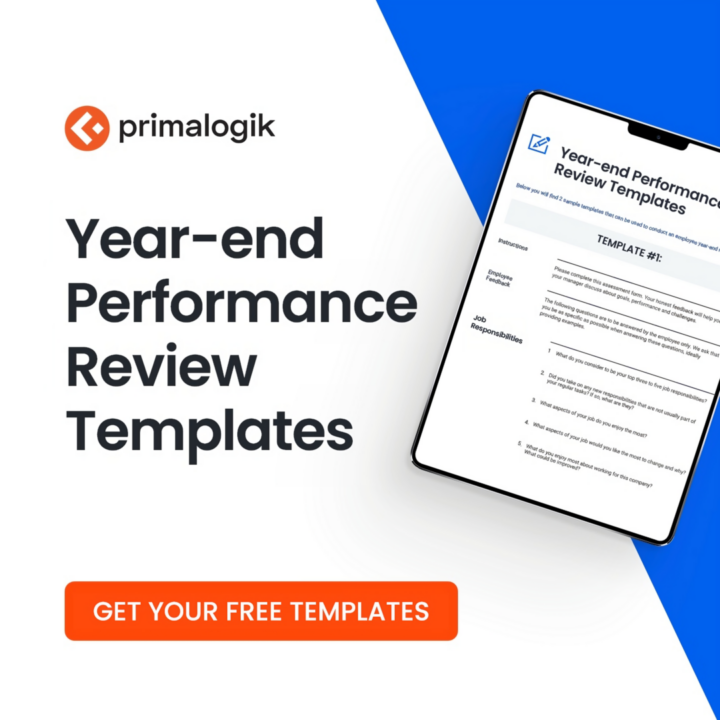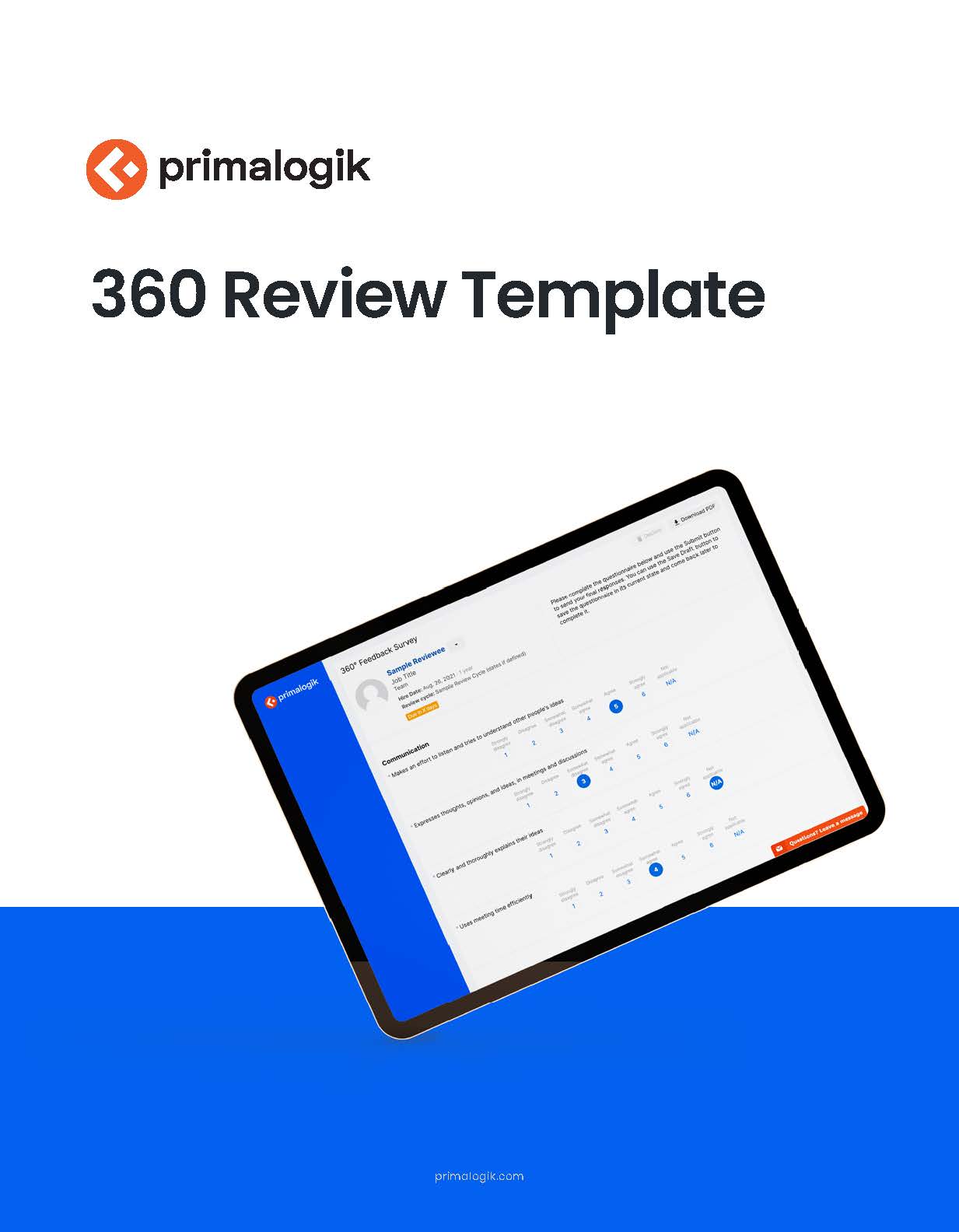Are you working to finesse your performance review questions and process? You may have put a lot of thought into selecting the right review template. You may have considered how frequently to hold employee reviews. And you may have nailed down best practices for conducting reviews. Now, you’re ready to dig deeper into the details.
Which brings us to one point: What types of questions should you ask when delivering performance reviews?
Navigation
1. The Purpose of Performance Review Questions
2. Categories of Performance Review Questions
3. Good Performance Review Questions: Examples
4. Examples of Bad Performance Review Questions
5. How to Answer Performance Review Questions
The Purpose of Performance Review Questions
Asking great performance review questions makes this meeting a dialogue, not a lecture. This will draw forth insights from the employee that inform the review. Great review questions follow up on the results of the evaluation. They seek employees’ input on how to better leverage strengths and overcome weaknesses.
Employees’ answers will shape the performance improvement plan you design with them. Importantly, performance review questions should cover the topics addressed in the written evaluation.
Categories of Performance Review Questions

Performance review questions should consider progress toward individual goals. Also consider which questions pertain to employees at different levels. The questions you ask will differ to some extent for employees, managers, and executives. Below, we list topics that have relevance for employees at particular levels.
Questions for employees
For employees, performance review questions should cover these key topics:
- Goal achievement
- Collaboration skills
- Technical proficiency
- Organizational skills
- Communication skills
- Ability to follow instructions
- Problem-solving skills
- Ability to learn from feedback
- How the organization and culture can improve
- How the team and manager can improve
First and foremost, employees need to work productively with their team. Second, they need the technical abilities to succeed in their job. They also need time-management and problem-solving abilities to truly excel.
Questions for managers
For managers, make sure to address these subjects in performance review questions:
- Team achievement
- Ability to coach and inspire others
- Communication skills
- Emotional intelligence
- Ability to train employees
- Project management abilities
- Performance management skills
- Strong grasp of organizational objectives
- Commitment to personal growth
- How the organization and culture can improve
Managers must develop a great rapport with their team. They must lead productive meetings and see projects to fruition. Performance review questions should consider whether they achieve the desired results. Moreover, questions will ask about their interpersonal skills, assessing their leadership abilities.
Questions for executives
For executives, choose performance review questions related to these areas:
- Communication skills
- Ability to lead effectively
- Strategic thinking abilities
- Innovation
- Ability to prioritize and delegate
- Decision-making proficiency
- Financial and market knowledge
- Understanding of business operations
- Analytical capabilities
- Articulation of a strong organizational vision
- How the organization as a whole can improve
Executives must understand how all aspects of the business work together. Further, they must lead others effectively across all departments. They must also communicate well in business negotiations, conversations with the board, and other settings. Additionally, they must think innovatively while maintaining a strong understanding of the market.
And they must demonstrate excellent analytical abilities. Questions should centre on topics like these.
Good Performance Review Questions: Examples

We’ve grouped performance review questions into the three main employee levels. You’ll see sample questions for the main skills needed at each level, along with general questions.
Employee-level questions
First, we present some general questions on personal improvement needs. Then, we’ll dive into specific topics.
Goal achievement
- What was your greatest accomplishment during the review period? Tell me about the process of achieving it. What steps did you take; what hurdles did you encounter?
- Tell me about your progress on current projects. What steps are you taking toward your goals?
- What growth areas have you focused on? How do you feel about the results you’ve seen?
Temperature check: personal improvement needs
- How could we better leverage your strengths?
- Do you have any strengths that go unused in your daily work?
- What do you contribute that goes unnoticed—or not noticed enough?
- Which areas of your improvement would you like to focus on?
- What would help you to strengthen them?
- What are your greatest barriers to success?
Collaboration skills
- Describe your level of collaboration with your team. Can you share some examples of teamwork you’ve engaged in?
- Could you collaborate more effectively in any ways? Please explain.
Technical proficiency
- What opportunities have allowed you to grow your skills?
- Which skills are you eager to develop?
- What abilities could you train others in?
Organizational skills
- How effectively do you prioritize and manage your time?
- When do you typically begin and end work?
- Do you feel you can leave work at work?
Problem-solving abilities
- Do you feel empowered to think creatively and try new solutions? Why or why not?
- Can you share any examples of how you’ve successfully solved problems?
- Have you proposed novel ideas that benefited the team?
Communication skills
- Have you navigated any tough interpersonal situations? How did you communicate within them?
- Describe how you participate in meetings. What would support you in contributing more effectively?
- Describe challenges in virtual communication that you’ve experienced. What would help you communicate more effectively?
Ability to follow instructions
- Do you have a strong understanding of your role? Please summarize your core responsibilities.
- How well do you typically understand your assignments?
Ability to learn from feedback
- How often have you asked for feedback from your manager? From coworkers?
- How do you respond when others offer unexpected feedback?
- Do you follow up on feedback, asking how you’re progressing?
Supporting the employee’s growth
- How do you learn best?
- Should I change anything about how I share feedback with you?
- What responsibilities do you enjoy the most? The least?
- What role do you aspire toward? What skills or experience do you need in order to get there?
Also ask about how the organization and you as a manager can improve. Inquire about work culture and teamwork.
- How can your team collaborate more effectively? What needs to change for that to happen?
- How can I better support your growth?
- Describe your ideal organizational culture. How can we get closer to that ideal?
- How do you feel about the company vision?
Again, this is not an exhaustive list of performance review questions. It’s simply a jumping-off point!
Manager-level performance review questions

These questions relate to how managers lead others. You can also ask the questions about goals and personal improvement listed above. Conduct conversations or surveys with your employees on these topics as well. This will reveal whether managers’ beliefs about their own effectiveness align with employees’ experiences.
Team achievement
- What was your team’s biggest win during the past few months? Describe the efforts that made it possible.
- What do you feel most proud of in regard to your team?
- How have your team’s competencies grown or changed over time?
Ability to coach and inspire others
- What types of coaching do you engage in with your team? Please describe in detail.
- If an employee comes to you with a problem, what steps do you take to help? Describe your typical approach, or share an example.
- Describe the format of your one-on-ones. How often do you hold them, and what topics do you cover? How do you set the agenda?
- Have you witnessed improvement among employees as a result of your coaching? Describe.
- Describe your efforts to improve engagement (or keep it high).
Communication skills
- Describe your efforts to check in with employees about their wellbeing.
- What modes of communication do you find most effective? How do you utilize them?
- What facilitation practices do you engage in to ensure productive meetings?
Emotional intelligence
- If an employee was not pulling their weight, how would you respond?
- Describe something an employee did recently that you felt grateful for. How did you show your appreciation?
Ability to train employees
- What methods of training employees have you engaged in over the review period?
- What techniques do you believe you should use more often?
- How could you improve your teaching abilities?
Project management abilities
- How do you make sure your team meets important deadlines? How did you handle any delays?
- Describe how you worked to troubleshoot issues that arose during a project.
Performance management skills
- How do you evaluate employees’ progress? What evidence do you use?
- How do you assess engagement? Have you noticed changes in engagement levels?
- What steps have you taken to boost engagement?
Strong grasp of organizational objectives
- Describe how your team’s work fits into the organizational mission.
- How do your team’s efforts further the organization’s vision?
- Describe how you’ve conveyed the vision and mission to your team.
Commitment to personal growth
- How have you solicited feedback from others, including employees?
- What steps have you taken to act on this feedback?
- How have you followed up to assess your progress?
As with employees, ask questions about organizational improvement as well:
- How can we better support your growth as a leader?
- What tools and resources do you need to manage more effectively?
- Which type of mentorship or training opportunities would benefit you?
- What culture shifts would promote better teamwork throughout the organization?
Now let’s take a look at performance review questions for executives.
Executive-level questions
These questions pertain to the ability to lead at the organizational level. The above questions on goals and personal improvement apply to executives too.
Communication skills
- How would you describe your communication style in meetings? With managers? With lower-level employees?
- How have you worked to strengthen your communication style?
Ability to lead effectively
- Describe your efforts to rally managers behind shared goals.
- Have you received any feedback on your approach? How have you integrated it?
Strategic thinking abilities
- Describe innovative ideas you have worked to bring to fruition.
- How have you and other leaders worked together to adapt to disruption?
Ability to prioritize and delegate
- How do you decide which responsibilities to delegate? Describe how this played out in a recent initiative.
Decision-making proficiency
- Please outline your decision-making process.
- What challenges have you faced in decision-making? How did you handle them?
Financial and market knowledge
- How do you stay current on market knowledge?
- Would you benefit from any learning opportunities in this area?
Understanding of business operations
- Describe how you stay in tune with what each department is doing and how their work connects.
- How do you promote collaboration across these areas?
Analytical capabilities
- Have you expanded your analytical abilities with the help of emerging tools? Explain.
- Would you or other leaders benefit from additional tools?
Articulation of a strong organizational vision
- How do you work to communicate the vision with others?
- Do you believe managers are relaying the vision effectively?
Feedback about the organization
- How can the organization better support your continued development?
- How can our culture improve?
- Does our vision need to change in any key ways?
- Do you need additional support to perform your role?
What makes these good performance review questions to ask? They ask for open-ended answers about the most relevant topics. Further, they take a neutral stance rather than prompting a particular answer. Let’s take a look at questions you shouldn’t ask to lend some perspective.
Examples of Bad Performance Review Questions

Avoid leading questions that beg for a “positive” or “negative” answer:
- “Does your team have the outstanding culture we expect here at Company X?”
- “Is your manager overly critical?”
- “Your manager has struggled with accountability in the past. Has that been a problem lately?”
These biased questions also do not prompt employees to elaborate. Avoid “yes or no” questions.
Steer clear of questions that essentially ask more than one question, too. These tricky questions often make an unfair assumption as well. For example, “Does your manager’s tendency to micromanage make you frustrated?” assumes that the manager does, in fact, micromanage.
Plus, it essentially asks two questions: whether the manager micromanages and whether the employee feels frustrated about it. Focus on one thing at a time!
Other examples of questions that make assumptions:
- “Why do you avoid giving feedback to your employees?” (This would only be appropriate as a follow-up question if a manager says she avoids giving feedback.)
- “Do your team’s collaboration difficulties stem from interpersonal issues?”
- “Have misunderstandings of the vision led to trouble with collaborating on projects?”
These loaded questions are difficult to answer accurately. As a result, they can prompt overly positive or negative answers.
You can refer to the written performance evaluation for more question ideas. Quality software can generate performance review items for particular roles or levels. You can integrate these evaluation questions into your lists of questions for employees.
How to Answer Performance Review Questions

Give employees a sense of which topics you’ll cover in the review. Then, they can gather their thoughts beforehand. Emailing an agenda that presents key topics will help them prepare.
Employees should compile a list of their major accomplishments over the review period. Prompt them to think about personal growth achievements as well as outcomes. They should also reflect on key challenges. Taking these steps will promote an organized and detailed discussion.
Emphasize that they should answer honestly. After all, this should be a supportive discussion that highlights areas for growth. Sharing candid input will let you collaboratively design steps for improvement.
By choosing great questions for performance reviews, you’ll gain insightful data. Tailoring the questions to the employee’s level will provide the most relevant information. Use it to guide their progress throughout the next review period!
Ready to upgrade your performance reviews? Learn how Primalogik can help by requesting a demo of our performance management software. Through tools like those mentioned above, we make the process simple.





